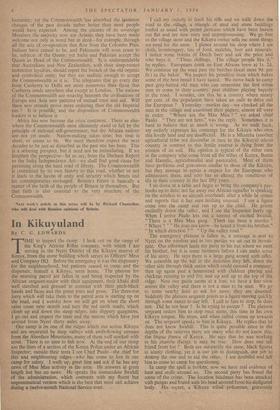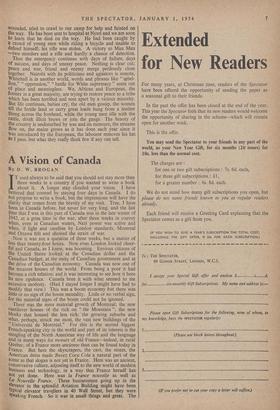In Kikuyuland
I call my orderly to fetch his rifle and we walk down the road to the village, a triangle of mud and stone buildings roofed as usual with petrol jerricans which have been beaten out flat and are now rusty and unprepossessing. We go first to the village store and the Kikuyu owner sells me some things we need for the mess. I glance around his shop where I see cloth, ironmongery, tins of food, matches, beer and minerals. 1 notice some bottles of Dutch beer and ask the price and who buys it. " Three shillings. The village people like it," he replies. Europeans drink an East African brew at ls. 2d. We continue up the road past the butcher (local meat 9d. per lb.) to the baker. We inspect his primitive oven which bakes some of the best bread I have tasted, We move back to camp past grey-haired old men who can remember the first white men to come to their country; past children playing happily in the road. I wonder, can this be a .country where ninety per cent. of the population have taken an oath to drive out the European ? Yesterday—market daywe checked all the men in the village and examined their papers;' almost all were in order. " Where are the Mau Mau ? " we asked chief Paulo. " They are not here," was the reply. Sometimes it is hard to believe that so much is 'wrong. As we walk back, my orderly expresses his contempt for the Kikuyu who own this lovely land and are disaffected. He is a Mkamba (another agricultural tribe not dissimilar in race to the Kikuyu) whose country in contrast to this fertile reserve is .dying-from the erosion of its soil. His opinion is typical of the other men in the company who come from all the tribes of Kenya, Bantu and Hamitic, agriculturalist and pastoralist. Most of them have problems and grievances similar to those of the Kikuyu, but they manage to retain a respect for the European who administers them, and who has so altered the .conditions of life in their country in the last fifty' years.
I sit down at a table and begin to bring the company's pay- books up to date; not far away our African signaller is speaking on the wireless to an aircraft overhead; after a while he comes and reports that it has seen nothing unusual. I see a figure come into the camp and run up to the chief. He points excitedly down the valley, and I see the Inspector hurry up. When I arrive Paulo lets out a torrent of excited Swahili. " There is a Mau. Mau gang. There has been a murder." " Where ? " He does not know--he heard it from his brother."
" In which direction ? " Up the valley road."
The emergency platoon is fallen in, a message is sent to Nyeri on the wireless and in two parties we set out to investi- gate. Our informant leads my party to his hut where we meet his brother, but it is some moments before I can make sense of his story. He says there is a large gang armed with rifles. We scramble up the hill in the direction they left, down the other side through thick maize which could conceal a company, then up again past a homestead with children playing and chickens running to and fro, and up and up to the top of the ridge. Now our guide seems at a loss; we have a fine view across the valley and there is not a than to be seen. We go to some nearby huts to ask for news; they are deserted. Suddenly the platoon sergeant points to a figure moving quickly through some maize to our left. I call to him to stop; he does not: Did he not hear ? Is he tryin.g to escape ? The platoon sergeant orders him to stop once more, this time in his own Kikuyu tongue. He stops, and when called comes up towards us. The sergeant speaks to him in Kikuyu. He replies that he does not know Swahili. This is quite possible since in the depths of the reserves there are many who do not know this, the. lingua franca of Kenya. He says that he was working in his shamba (farm); it may he true. How does one tell friend from foe ? Both are outwardly the same, black figures in scanty clothing, yet it is our job to distinguish, our job to destroy the one and to aid the other. I am doubtful and tell him to come to camp for questioning. Thus the emergency continues with days of failure, days of success, and days of uneasy peace. Nothing is clear cut; peace and war, friend and enemy merge perilously close together. Nairobi with its politicians and agitators is remote, Whitehall is in another world, words and phrases like " " oppression," " battle for White supremacy " seem out Qf place and meaningless. We, African and European, the former in a great majority, are trying to restore peace to a tribe which has been terrified and rent apart by a vicious minority. But life continues, babies cry, the old men gossip, the women till the fertile land or carry great loads hung from a leather thong across the forehead, while the young men idle with the cattle, drink illicit brews or join the gangs. The beauty of the country is undisturbed by war and its rumours, the streams flow on, the maize grows as it has done each year since it *vas introduced by the European, the labourer removes his hat as I pass, but what they really think few if any can tell.











































 Previous page
Previous page